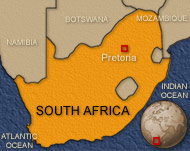South Africa to benefit from debt relief
Debt relief for many of Africa’s poorest countries should help improve their weighed-down economies, but it is unlikely to do much any time soon to make them attractive to financial investors.

A dearth of markets, scant liquidity for what assets are available and poor governance will still haunt the sub-Sahara despite the Group of Eight’s decision to write off some of the region’s heavy debt.
With the exception of South Africa, it is just not on the global big-money players’ radar screens.
“(They are) not just poor and weighed on by debt,” said Bob Parker, vice-president of Credit Suisse Asset Management. “Most of these countries do not have developed capital markets.”
They are miles apart from other emerging market regions such as Latin America and Asia, he said.
Britain, Japan, Canada, the United States, France, Italy, Germany and Russia said on 11 June they would write off all the multilateral debts of 18 poor nations, including 14 in Africa.
The immediate African beneficiaries of the move – which was widely welcomed – will be Benin, Burkina Faso, Ethiopia, Ghana, Madagascar, Mali, Mauritania, Mozambique, Niger, Rwanda, Senegal, Tanzania, Uganda and Zambia.
It speaks volumes, however, that the $40 billion being written off is seen as so important to these countries’ cash-strapped economies. By international investing standards, the write-off is a drop in the bucket.
The amount pales, for example, in comparison with the roughly $850 billion in US mutual fund assets managed by Vanguard Group alone and is less than a tenth of the investments managed by PIMCO, the world’s largest bond fund.
Good news
Like others, investment strategists say the write-off is good news, that it will allow more resources to be spent by poor countries to create what they need to improve their lot.
|
“What the G8 has not focused on (in its deliberations about poverty) is the development of local capital markets“ Bob Parker, |
“If a country is in a bad shape on the debt side, it is going to be stretched to provide the right infrastructure,” said John Carlson, who heads Fidelity Investments emerging markets team in Boston.
In a similar vein, Mark Mobius, the emerging markets guru at Franklin Templeton, said the key would be “conditionality” – whether the write-off was linked to countries carrying out needed reforms.
But all this is very long term and obscures the main issue for investors, which is that when it comes to Africa there are not that many places they can invest in even if they wanted to.
It is no coincidence that leading investment houses – many of which have large teams working on Asian, Latin American and eastern European emerging markets – barely mention Africa.
This is underlined by MSCI’s main emerging markets equity index – which many investors use to guide funds – contains no companies north of South Africa until Egypt and Morocco.
Bad news
“You have a limited number of countries, ex-South Africa, where you have stock markets,” said Credit Suisse’s Parker. “Where you do have stock markets … the size of the markets is small, liquidity is small, corporate governance is a problem.”
“What the G8 has not focused on (in its deliberations about poverty) is the development of local capital markets,” he said.
 |
|
South Africa is said to benefit |
Investors do pay a little more attention to the region when it comes to bonds, but even here investment is very marginal. As with equities, there is concern about liquidity – the ability to sell quickly if need be.
“There is little liquid tradable debt available,” said Thomas Moore, an investment director with Standard Life Investments.
Even PIMCO, despite having a huge presence on global bond markets, has little interest in the sub-Saharan region.
Tim Haaf, an emerging market portfolio manager, said the firm held “virtually nothing” in mid-Africa other than a small position in Nigerian debt.
Cutting debt may make for better sovereign bond ratings, but it is likely to have minimal immediate impact.
So where does that leave investors? Ironically, it may be one of the countries not targeted by the G8 that benefits most – South Africa.
South Africa
Investors have been using South Africa as a proxy for exposure to what returns are available in the poorer region to the north and are likely, if anything, to increase this.
Franklin Templeton’s Mobius, for one, said he had deserted mid-Africa for South African firms that would gain from business in the region some time back.
“We withdrew from all these places because we found we could get what we want in South Africa,” he said.